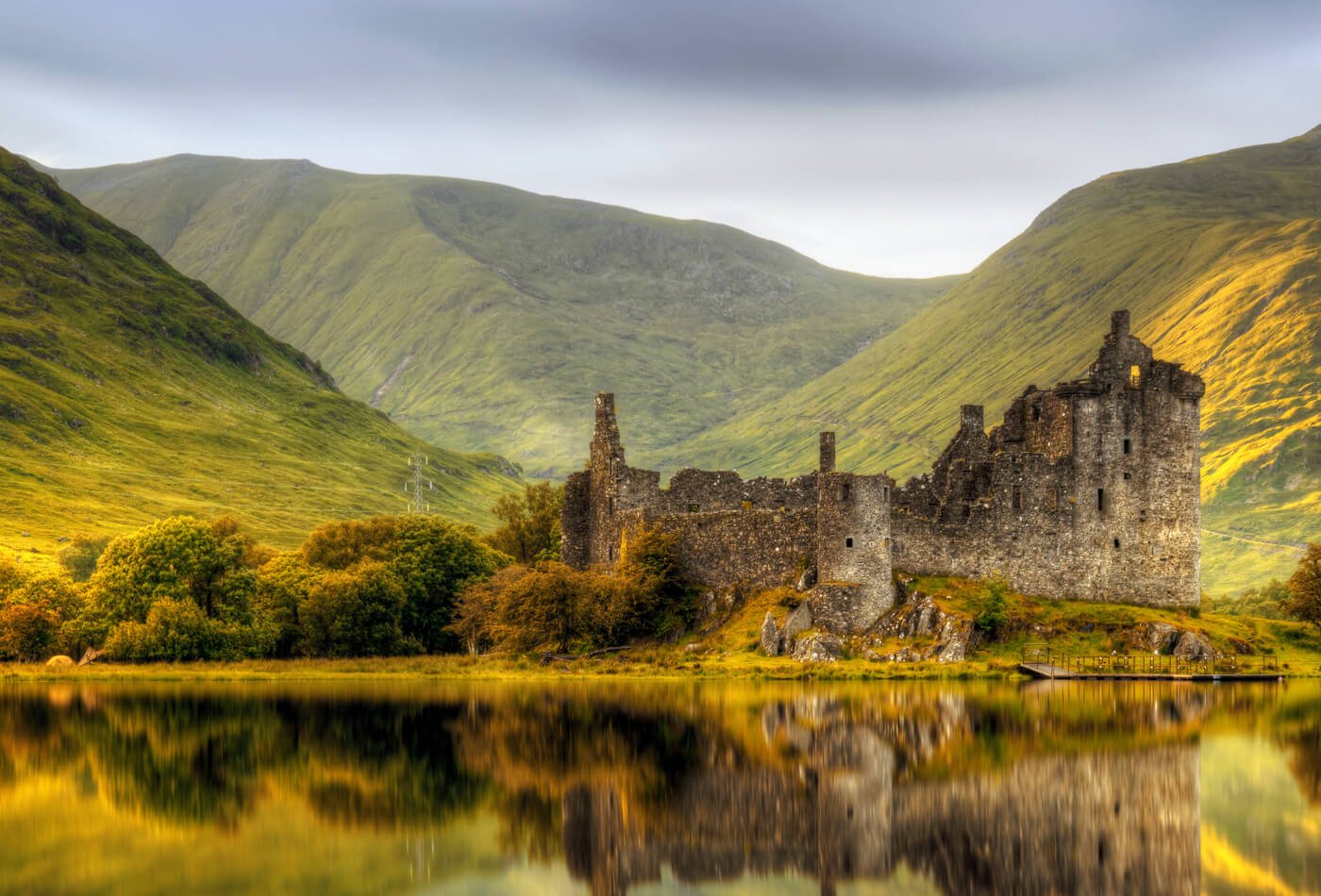Scotland, a country of breathtaking natural beauty and a rich cultural heritage, occupies the northern third of the island of Great Britain.1 Known for its rugged landscapes, vibrant cities, and legendary folklore, Scotland captivates visitors with its unique blend of history, culture, and adventure.
Historical Highlights
The Jacobite Risings: A series of rebellions aimed at restoring the Stuart monarchs to the British throne, these events played a significant role in Scottish history.
The Industrial Revolution: Scotland played a crucial role in the Industrial Revolution, with cities like Glasgow becoming major centers of shipbuilding and heavy industry.
World Wars: Scotland made significant contributions to both World Wars, with many Scots serving in the British Armed Forces.
A Land of Diverse Landscapes
Scotland boasts a diverse range of landscapes, from the dramatic peaks of the Scottish Highlands to the rolling green hills of the Lowlands.
The Highlands: A vast and awe-inspiring region dominated by rugged mountains, deep lochs (lakes), and dramatic coastlines. Iconic landmarks include Ben Nevis, the highest mountain in the British Isles, and Loch Ness, legendary home of the Loch Ness Monster.
The Lowlands: Characterized by fertile farmlands, rolling hills, and charming villages. This region is home to historic cities like Edinburgh and Glasgow, offering a blend of urban sophistication and rural charm.
The Islands: Scotland is an archipelago, with over 790 islands scattered along its coast. The most famous include the Isle of Skye, known for its dramatic landscapes and ancient castles, and the Orkney Islands, a collection of islands steeped in history and archaeology.
A Rich Tapestry of History and Culture
Scotland’s history is deeply intertwined with legends, myths, and ancient traditions.
Ancient History: From the Neolithic period onwards, Scotland has been inhabited by various peoples, leaving behind a rich archaeological legacy.
Viking Age: The Vikings left a significant impact on Scottish culture, particularly in the northern isles.
Medieval Scotland: The medieval period saw the rise of powerful kingdoms and the construction of numerous castles, including Edinburgh Castle and Stirling Castle.
The Enlightenment: The 18th century saw Scotland experience a period of significant intellectual and cultural growth, known as the Scottish Enlightenment. Figures like David Hume and Adam Smith made significant contributions to philosophy, economics, and science.

Scottish Culture
Language: Scottish Gaelic, a Celtic language, has a long history in Scotland, although English is the most widely spoken language today.
Music: Scottish music is renowned worldwide, with bagpipes, fiddles, and traditional folk songs playing a central role.
Literature: Scotland boasts a rich literary tradition, with renowned authors including Robert Burns, Sir Walter Scott, and Robert Louis Stevenson.
Food and Drink: Scottish cuisine is known for its hearty dishes, such as haggis, neeps, and tatties, and its renowned whiskies.
Tourism and Attractions
Edinburgh: The capital city, Edinburgh, is a UNESCO World Heritage Site, renowned for its historic Old Town, the iconic Edinburgh Castle, and the Royal Mile.
Glasgow: Scotland’s largest city, Glasgow, is a vibrant cultural hub with a rich architectural heritage and a thriving arts scene.
Loch Ness: The legendary Loch Ness is a major tourist attraction, with visitors flocking to the area in hopes of spotting the elusive Loch Ness Monster.
Outdoor Activities: Scotland offers a wide range of outdoor activities, including hiking, climbing, cycling, kayaking, and wildlife watching.
Challenges and Contemporary Issues
Economic Development: Scotland faces economic challenges, including regional disparities and a reliance on certain sectors.
Independence Movement: The debate over Scottish independence continues to be a significant political issue.
Environmental Concerns: Addressing climate change and protecting Scotland’s natural environment are important challenges.
A Land of Legends and Folklore
Mythical Creatures: Scotland is steeped in folklore and legends. Beyond the Loch Ness Monster, mythical creatures like the Selkie (a seal that transforms into a human) and the kelpie (a shape-shifting water horse) feature prominently in Scottish mythology.
Fairy Tales: Scottish folklore is rich in fairy tales, with tales of fairies, brownies (helpful household spirits), and the mischievous kelpie captivating generations.
Scottish Culture: A Closer Look
Highland Games: These traditional gatherings feature athletic competitions like the Highland Games, with events such as the caber toss, hammer throw, and tug-of-war.
Whisky: Scottish whisky is world-renowned for its quality and variety. From the smoky Islay malts to the sweeter Speyside whiskies, there’s a dram to suit every palate.
Tartans: The distinctive patterns of tartan, traditionally associated with Scottish clans, are a symbol of Scottish identity.
Opportunities
Addressing Depopulation: Rural depopulation is a significant challenge in some parts of Scotland, with young people moving to cities in search of employment opportunities.
Developing Sustainable Tourism: Balancing the economic benefits of tourism with the need to protect the environment is a crucial challenge.
Promoting Renewable Energy: Scotland has significant potential for renewable energy, particularly wind and hydro power, and is actively pursuing a transition to a low-carbon economy.
Final Thoughts
Scotland is a country of captivating beauty, rich history, and vibrant culture. From the dramatic landscapes of the Highlands to the bustling cities of Edinburgh and Glasgow, Scotland offers a unique and unforgettable travel experience. Whether you are exploring ancient castles, hiking through breathtaking scenery, or simply enjoying the warm hospitality of the Scottish people, Scotland is sure to leave a lasting impression.
FAQs
What are some of the unique aspects of Scottish Gaelic culture?
Scottish Gaelic culture boasts a rich tapestry of unique traditions and expressions. Gaelic music is particularly distinctive, featuring instruments like the bagpipes, fiddle, and clàrsach (harp), alongside traditional songs and ballads. Gaelic literature encompasses a rich body of poetry, prose, and folklore, reflecting the unique history and culture of the Gaelic-speaking communities. Gaelic festivals, such as the Royal National Mòd, play a vital role in celebrating and preserving Gaelic language, music, and culture through competitions, concerts, and cultural events.
What are some of the environmental challenges facing Scotland?
Scotland faces several significant environmental challenges. Climate change poses a serious threat, with rising sea levels, more frequent extreme weather events, and changes in biodiversity impacting the country. Protecting Scotland’s diverse ecosystems, including its iconic landscapes, peatlands, and marine environments, is crucial. Transitioning to a low-carbon economy while ensuring energy security remains a key challenge as Scotland strives to harness its renewable energy potential, such as wind and hydro power.
To read more, Click Here




Leave a Reply